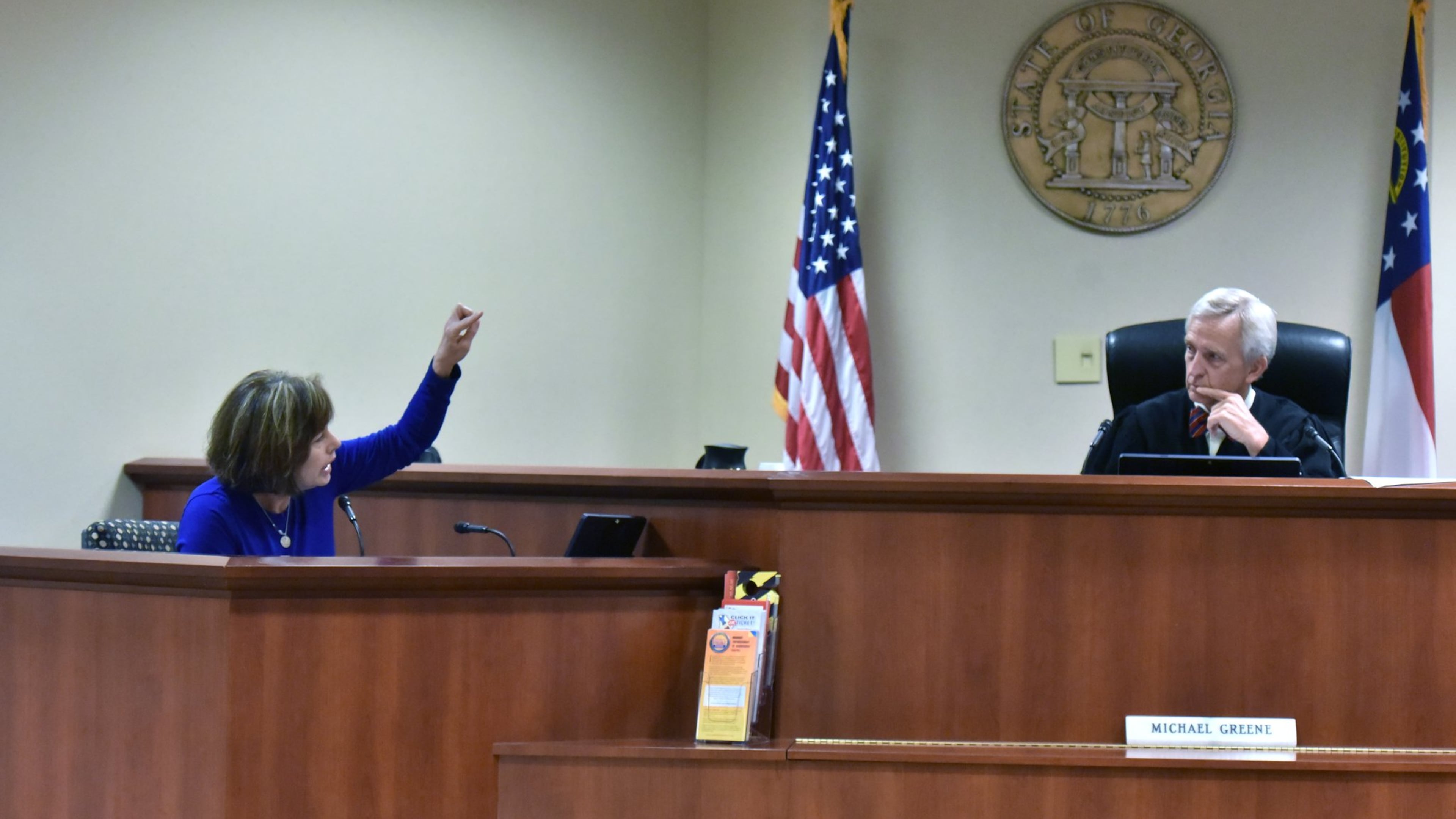Students safer, but some question bus camera use

When Wendy Gunn received a mailed notice from Gwinnett County Recorder’s Court that her car had passed a school bus with the stop arm extended and lights flashing last December, she immediately recalled the incident.
“I had turned the corner and the stop arm came out almost instantly. If I had stopped, I probably would have been rear-ended,” she said.
She figured she’d explain her situation to the judge and the misunderstanding would be quickly cleared up.
Chief Judge Michael Greene quashed her hopes. He told everyone who showed up in court the preponderance evidence was already against them, and that excuses such as “I didn’t see the stop sign,” or “The sun was shining in my eyes,” weren’t going to fly.
“The court is made to be somewhat intimidating,” said Gunn. “People are strongly encouraged to pay … and flee.”
Gunn paid. But she is appealing the case and challenging the law, which some defense attorneys and court officials see as flawed. It has put her in a spot of defending her legal rights, but if successful it could erode the law which seeks to make students safer.
Georgia was one of the first states to allow local school systems to adopt bus camera laws. The cameras take video of scofflaws who zoom past as students get on or off, then a police officer reviews the video and sends the car owners citations by mail. The law was spurred by two Cobb mothers who urged a legislator to act in 2009 after a 5-year-old was killed by a driver who passed a bus. At least 19 other states have adopted similar laws.
By 2011, Cobb County armed about 100 of it’s 1,000 buses with cameras — all the systems equip only a small percentage of buses. Gwinnett joined the movement in 2015, Fulton approved its local law in 2016, Clayton County and Atlanta Public Schools got on board, and many other systems have joined them. DeKalb is the only metro district without cameras, though they have discussed it.
The scale of the illegal passing problem is significant. The annual one-day snapshot in 2017 by the National Association of State Directors of Pupil Transportation Services gives a glimpse of the danger. The 106,976 participating bus drivers in 30 states reported 78,239 illegal bus passes. Georgia had more drivers participating than most states, and its share was 7,945 passes.
Data from Gwinnett County shows the scale locally, and it hints that the fines doled out are dissuading drivers from passing, which makes students safer. The number of tickets in Gwinnett in 2015 was 22,022, with over $4 million in fines. The incidences have trended downward since, with 16,322 illegal passes in 2017.
Charles Territo, a spokesman for American Traffic Solutions, a bus camera contractor who works with some Georgia school systems, said:“These programs are designed to change driver behavior. Our records show that 99 percent of drivers who’ve been ticketed once haven’t received a second ticket.”
Michael Cavaiola, a spokesman for Redflex Traffic Systems that runs the program in Gwinnett County and others, said: “It should be enough for drivers to know that they could hurt or kill a child to keep them from driving past school buses when students are getting on or off. But it takes the ticket to remind many people that what they’re doing is illegal. The statistics show it works.”
The two vendors use similar systems. They contract with school systems and provide the cameras which record the alleged violations, and they prescreen the video which they send to a police officer. Schools and local law-enforcement get a cut of the fines, but the vendors also get up to 60 percent of the money.
When the stop arm on the bus is extended, the camera begins recording. A photo of the car tag is taken, but it rarely captures a photo of the driver.
A certified law-enforcement officer, who is employed by the city or county, reviews the video and determines if a crime has been committed. That officer looks up the owner of the vehicle and writes the citation. The vendor mails out the citations.
That early part of the process can create legal problems, as the use of video evidence alone, and having a citation mailed by a third party, can be tricky in court cases, according to the Georgia Association of Criminal Defense Lawyers.
“Several years ago, traffic light cameras were popular. And most of those were taken down in the face of legal challenges,” said J. Scott Key, president of GACDL.
The city of Atlanta, along with others around the state and nation, have removed many red-light cameras because they caused more accidents when people slammed on brakes to avoid getting a ticket; or the cameras were shown to be not properly operated, subject to various legal challenges or ineffective at improving safety.
When Roswell did away with cameras in 2012, the city’s transportation director said the number of crashes before the cameras were installed compared to after were virtually the same.
Some complained this showed that camera-enforced laws are aimed at collecting fines for governments, though public safety is the stated objective.
Sam Ham, executive director of Fulton County Schools Transportation Services, disputes that. Fulton has less than 3 percent of its 946 buses equipped with the camera systems. If it were after money, Fulton could equip many more buses.
“The program is designed to heighten awareness and affect motorists’ behavior. It’s about student safety,” he said.
Defense attorneys say having citations sent by contractors may violate constitutional rights for giving notice, and because of the way the citations are handled, the fines are considered civil rather than criminal penalties, which can create legal conflicts.
With those problems and others, the number of red-light cameras dropped. In 2008, at the program’s height, 25 jurisdictions in Georgia had a total of 64 intersections with red-light cameras. But by 2013 just eight governments had 22 cameras, according to the Georgia Department of Transportation.
Leslie Spornberger Jones, an Athens defense attorney who specializes in traffic ticket law, said another problem is the law creates certain presumptions that allows the court to infer from the photo that car’s owner was the driver.
This presumption seems to absolve the government of having to prove an essential element of the offense. This is ripe for constitutional challenges, said Jones who also has experience as a judge and a prosecutor. But appeals are expensive, much cheaper than paying a fine.
Other questions have been raised by judges.
Cobb County State Court judges dismissed cases earlier this year citing “improper service” for tickets issued by mail from a third-party. Since the tickets didn’t come from the state court clerk, there was no identifying number as with other state court cases. Cobb State Court Clerk Angie Davis stepped in to fix the problem.
Other problems are created because the cases are heard in a myriad of courts from state to magistrate court, which create other potential legal glitches.
Cobb County Solicitor General Barry Morgan said even though the citations are civil cases and there’s no points taken from a driver’s license or possibility of jail time, the cases in every county should be heard in state court.
“There’s no move to standardize that, but I think it’s important to get them all into state court,” he said. “There are more procedures, but there’s also more transparency.”
The problems make Key, the defense lawyers president, “suspect that this scheme [school bus cameras] will ultimately go the way of the traffic light camera.”
Gunn like many others in metro Atlanta found the court proceedings confusing and one-sided.
With two school-age children of her own, Gunn said she used to think the law was a good idea, and then she found herself on the other side.
During her 10-minute trial, Judge Greene dismissed her arguments that Redflex wasn’t properly licensed to operate in the state and that the video wasn’t clearly marked at the time the amber lights were flashing and the when the stop arm was deployed.
When she asked about a transcript or some sort of record of the trial, Judge Greene told her that is no record in that court.
“You should have made arrangements for that in advance,” he said.
Gunn was found guilty and charged a $300 fine. If she had not paid, the state would have prevented her from re-registering her vehicle.
Although the $300 fine won’t be a financial hardship for her, Gunn and her husband filed an appeal to Gwinnett Superior Court.
She is representing herself, and is carefully working her way through the system by asking questions, filing open records requests and researching the law. The costs of an appeal filed by a lawyer is prohibitive, when looking at a $300 fine.
“I really just want this to be over,” she said. “But if I don’t fight for what’s right, who will? If I’d been at fault, I would have paid the fine and been O.K. with it. This isn’t right the way people are treated.”
Rep. Don Parsons, R-Marietta, who authored the first bus camera bill said the initial legislation wasn’t done in haste. It took two years to craft and another three years to eventually get passed, said Parsons. Other adjustments have been made, and it is still being enforced in courts.
“The legislative council did a review and found no problems,” he said. “And the bill eventually got into the judicial committee where a group of lawyers looked it over.”
There have been no legal challenges to the law in six years.
“It’s good legislation. It’s solid,” he said. “I don’t want people to forget that thiks is about student safety. Don’t pass buses with the flashing stop sign and this won’t be an issue for you.”



